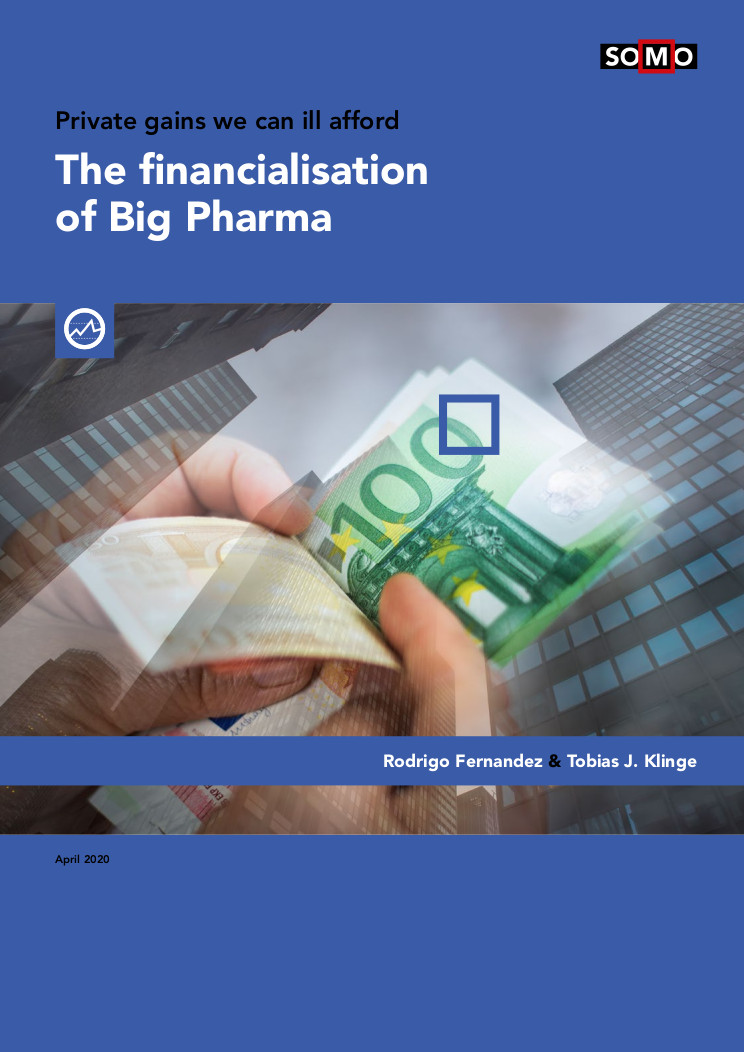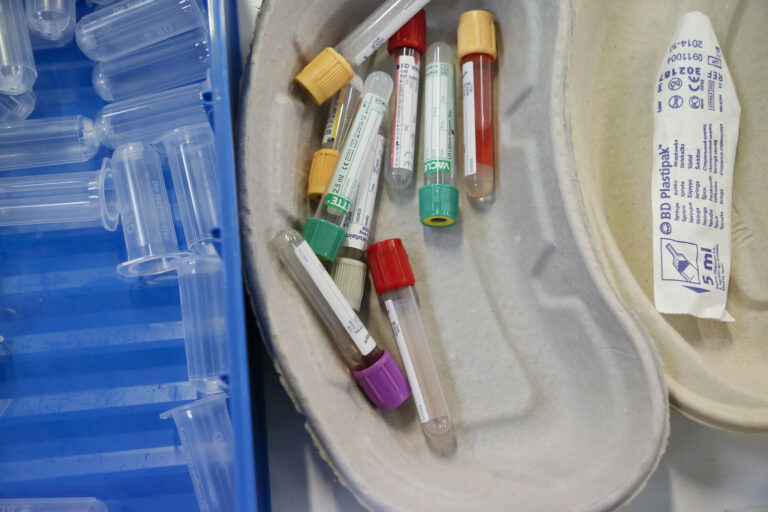Public health over pharmaceutical profit
Extremely high-priced medicines make certain treatments increasingly inaccessible and put national healthcare budgets under enormous pressure, even in high-income countries. This leads to unequal access to life-saving medicines within and across countries. While a large part of the early stages of research for medicines is done in public institutions with public funding, knowledge ends up being privatised and patented with billions of profits for the pharmaceutical industry and shareholders.
At SOMO, we research public return on public investment; how can we make publicly funded medicine development serve global health needs?
The pharmaceutical industry is among the most profitable globally. Drug prices are set by patent monopolies, and governments and society are beholden to a few powerful corporations. SOMO investigates the financialisation of the pharmaceutical industry, the high prices of medicines, the monopolies and patent politics.
Publicly funded drug development should go hand in hand with transparency, knowledge sharing, responsible licensing and equitable access conditions.
Highlighted Publications
-
Pharma’s pandemic profits Published on:
 Esther de HaanPosted in category:Publication
Esther de HaanPosted in category:Publication Esther de Haan
Esther de Haan
-
Private gains we can ill afford Published on:
 Rodrigo FernandezPosted in category:Publication
Rodrigo FernandezPosted in category:Publication Rodrigo Fernandez
Rodrigo Fernandez
-
Overpriced Published on:
 Irene SchipperPosted in category:Publication
Irene SchipperPosted in category:Publication Irene Schipper
Irene Schipper
For better public returns on public investments in drug development
Taxpayers are paying repeatedly for the development costs of medicines. Pharmaceutical companies leverage fundamental research conducted by universities and institutes and use public health infrastructures to conduct clinical trials. Also, pharmaceutical companies make use of tax incentives and grants that are made available to stimulate innovative drug development.
Public money comes again into play when national healthcare reimbursement schemes pay for the high medicine prices. Taxpayers’ money also gets funnelled off and used for public venture capital to fund offshoot biotech companies from universities. Finally, taxpayers risk having to pay another round to make up for the unpaid taxes of the pharma companies.
Because of a lack of overview on the amount of public money invested in these ways, there is no transparency regarding the total public funding of medicine development.
However, our case studies and research show that public funding in the Netherlands helped to develop medicines that are or will be, sold at a very high price. Pharmaceutical companies like AstraZeneca, MSD, Novartis and their shareholders make huge profits when their new drugs come onto the market. Taxpayers receive little return on those public investments if the prices end up being too high to afford.
A perfect example of this phenomenon is the development of COVID-19 vaccines.
Governments around the world gave upfront financing and spent at least US$5.8 billion in grants and tens of billions in advance purchasing agreements to support the research and production of COVID-19 vaccines during the pandemic. Only four pharmaceutical companies generated at least US$90 billion in profits from their COVID-19 vaccines and medicines. And according to the US think tank Public Citizen, Moderna’s COVID-19 vaccine was entirely paid for by taxpayers. Yet, companies chose to prioritise high-value sales of vaccines to high-income countries and thus added to global inequalities in terms of access to vaccines. Most of these profits are divided between the companies and their private shareholders.
-
Profiting from a pandemic (pdf, 272.22 KB)
SOMO believes that the pharmaceutical industry should provide transparency about their high-priced drugs’ research costs and the share of public funding. Pharmaceutical companies argue that the prices of medicines are high as they need to recoup the very expensive R&D costs, which they are not willing to disclose at the same time.
Fighting tax avoidance across sectors
Taxation plays a pivotal role in the sustainable development of society, serving as a primary and crucial source of financing. However, there are affluent individuals, financial institutions, and multinational corporations that use tax havens to evade or minimise their tax obligations. Discover our work in that area.

Shareholders’ profits prioritised over pharmaceutical research
Our research at SOMO into the world’s 27 largest pharmaceutical companies shows that, over the past 20 years, more money was invested in financial activities than in medicine production and research. Borrowed money failed to reach investments in the research and development of new drugs or production capacity. Instead, it has been mainly paid to shareholders as dividends and spent on buying back company shares.
In total, US$1,540 billion was paid out to shareholders between 2000 and 2018. At the ten largest pharmaceutical companies, the overall distribution of funds to shareholders was 142 per cent higher than what was spent on research and development in a given year.
-
The financialisation of Big Pharma (pdf, 339.03 KB)

Dodging taxes: pharmaceutical tax avoidance methods
Around 75 per cent of the pharmaceutical industry’s income is reported offshore for tax purposes. Even compared to other multinationals, the profit shifting of pharmaceutical companies is extreme. These companies now commonly pay lower tax rates than small business owners, schoolteachers, and firefighters.
Pharmaceutical companies that profited massively from the COVID-19 pandemic and work done in public research institutes ensured that these profits could be shifted to countries with lower taxes. A leaked contract between Moderna and the European Commission indicates that the company’s vaccine profits will end up in Basel, Switzerland. Moderna is likely to pay little in taxes in this low-tax jurisdiction. Additionally, Moderna holds many patents in the US tax haven state of Delaware, where income from patents is exempt from taxation.
Another example of a company avoiding paying taxes while receiving public funding is the biotech giant Qiagen, one of the leading producers of Coronavirus testing kits. Our research shows how Qiagen has used intercompany loans between its branches in the tax havens of Malta, Ireland, and Luxembourg to avoid corporate income tax in the Netherlands. Based on an in-depth investigation, SOMO estimates the company has avoided paying €142 million in Dutch corporate income tax.
Big Tech, Big Pharma and public health systems
The healthcare sector is one of the next growth frontiers for Big Tech companies. Amazon, Google, and Microsoft, as well as smaller tech companies, are quickly expanding in different segments of public healthcare across the globe. Among other developments, tech companies have invested substantially in developing new digital health infrastructures and data storage, collection, and analysis.
While there are strong concerns about the expansion of tech companies in health care in relation to patient privacy, these discussions do not address, and may even distract from, other fundamental risks to societies: the capture of the infrastructural build of our future health systems.
By developing and maintaining digital health infrastructure, a few very large and wealthy multinational corporations will gain operational control over public health systems and public health data. This may cause societies and governments to lose control of their public healthcare systems. Through our research, we focus on the monopoly power of tech companies over public health data infrastructures and health datasets.
Do you need more information?
-

Esther de Haan
Senior Researcher -

Irene Schipper
Senior Researcher
Latest updates
-
 Big Pharma raked in USD 90 billion in profits with COVID-19 vaccinesPosted in category:News
Big Pharma raked in USD 90 billion in profits with COVID-19 vaccinesPosted in category:News Esther de HaanPublished on:
Esther de HaanPublished on: -
 EU health data law rolls out the red carpet for Big TechPosted in category:Long read
EU health data law rolls out the red carpet for Big TechPosted in category:Long read Irene SchipperPublished on:
Irene SchipperPublished on: -
Civil society coalition urges EU to put the interests of patients and citizens at the heart of the European Health Data SpacePosted in category:Published on:Statement
Related Topics
Discover more of SOMO’s work and publications.





